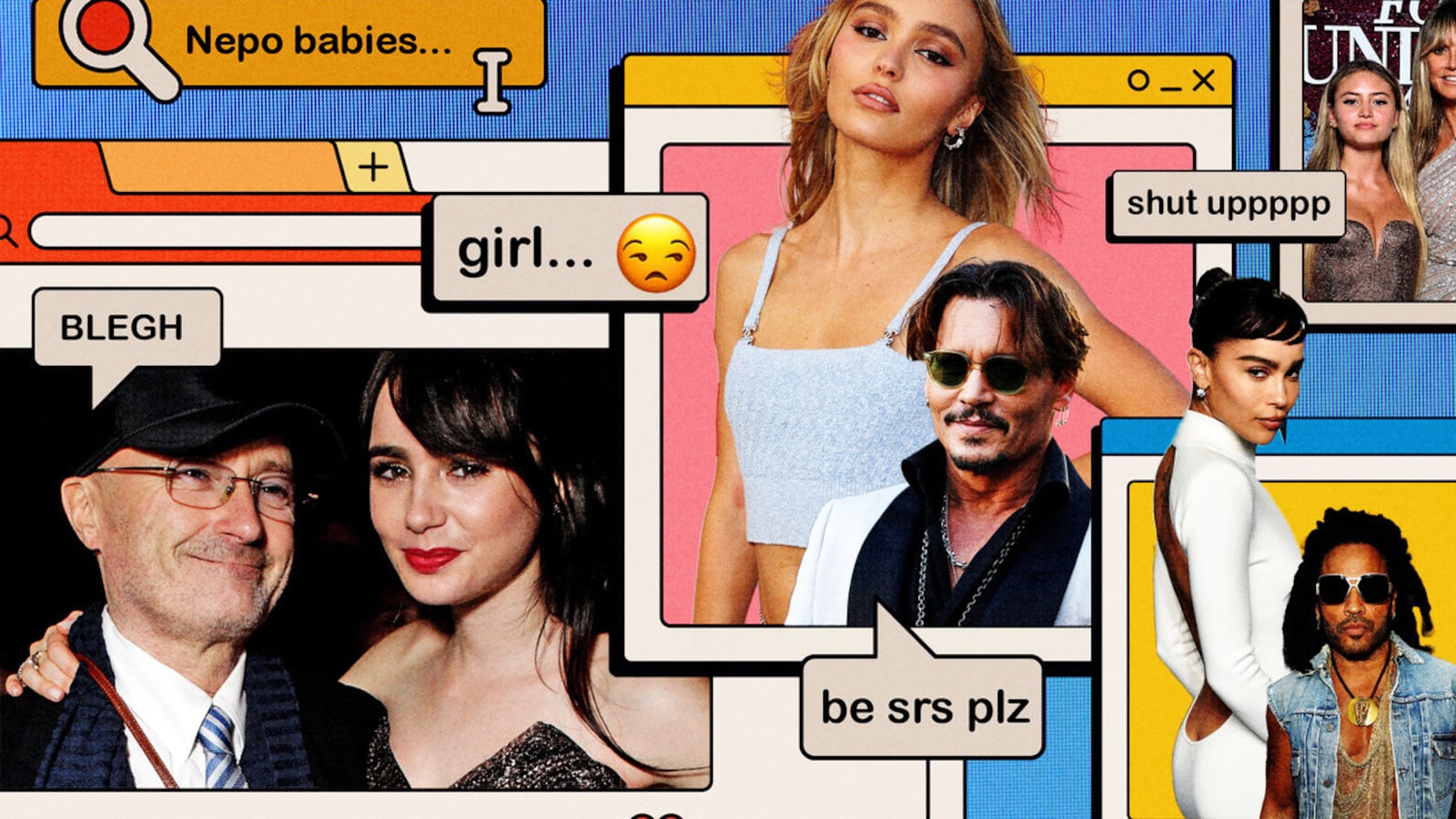Like a virus that refuses to be cured, the celebrity nepotism debate—a.k.a. the escalating trend of identifying famous “nepo babies” who accessed their chosen industry by riding on the coattails of their parents—has once again risen to the surface of acidic internet discourse due to a flurry of strangely similar interviews given by young stars in the past week.
Zoe Kravitz, daughter of Lenny Kravitz and Lisa Bonet, told GQ in an interview published Nov. 15 that she has deep insecurities about working in entertainment stemming from her famous parentage. Then, she contradicts herself: “It’s completely normal for people to be in the family business,” Kravitz said to GQ. “It’s literally where last names came from. You were a blacksmith if your family was, like, the Black family.”
“People are going to have preconceived ideas about you or how you got there, and I can definitely say that nothing is going to get you the part except for being right for the part,” actress and model Lily-Rose Depp, the daughter of Johnny Depp and French singer Vanessa Paradis, told Elle in an interview published one day later.
Depp’s comments triggered a firestorm of outrage from the modeling community initiated by Italian model Vittoria Ceretti. “I get ‘I’m here and I worked hard for it,’ but I really would love to see if you would have lasted through the first five years of my career,” Ceretti posted on Instagram.
This snowballed into an internet pile-up in which thousands mocked Depp for believing she belonged in the fashion industry on her own merit. “Lily-Rose Depp is complaining about people calling her a nepotism kid when she’s 5’2” and walking for Chanel lmao GIRL,” reads one tweet that’s been favorited upwards of 138,000 times.
“It was out of the question that people would think that I use a free pass thanks to my name,” Lily Collins, actress and daughter of Phil Collins, told Vogue France in an interview published Nov. 22. “I’m proud of my dad, but I wanted to be me, not just his daughter. For that, I was ready to wait to break through.”
“I want to feel like I deserve things and not just like I’ve been given things,” Lourdes Leon, Madonna’s daughter, said in a new interview with The Cut this week. “And, yes, there’s undeniable privilege that I’d be stupid to not realize. Nepotism babies are pretty awful usually, and my mom and my father raised me to be so much smarter than that.”
There’s nothing new about nepotism, first coined in the 14th or 15th century to describe the corrupt tactic of childless popes assigning prominent positions in the Catholic Church to their nephews.

Zoe Kravitz and her parents Lenny Kravitz and Lisa Bonet.
WireImageAmerican presidential and political nepotism is nearly as old as the country itself, and runs the gamut from John Quincy Adams catching flack for hiring family members to the Bush and Kennedy dynasties. The most egregious recent example is, of course, Donald Trump’s habit of passing out prominent White House advisory roles to his deeply unqualified children and in-laws.
And although Hollywood nepotism is uniquely high-profile, career favoritism towards one’s family members permeates every industry—the prohibitive cost of major-city living and education has made journalism increasingly impossible to pursue professionally without the aid of a well-connected relative (looking at you, Chris Cuomo) or extensive financial cushioning.
This summer, major college football coaches spoke out about how nepotism in their field contributes to a dearth of diversity in coaching. Nepotism in the legal field has long been a point of intense contention.
Given nepotism’s obvious ubiquity, there’s something inherently ridiculous about all the hedging the children of celebrities do when asked to acknowledge how they themselves became celebrities, especially because the world of entertainment is such a particularly prominent offender (important note: sometimes the kids of famous entertainers turn out to be pretty great themselves).
Ben Stiller’s dad is a famous comedian, Liza Minelli’s mom is the one and only Judy Garland, Kendall Jenner got her start in modeling in part because of her Keeping Up With the Kardashians prominence; the list could spiral on endlessly.
Does Lily Collins really think her name didn’t get her places, even if she wasn’t consciously using a “free pass?” Does Zoe Kravitz really think winding up in The Batman is the same thing as being a blacksmith’s apprentice?
“Direct nepotism is easily measurable,” Matt Earle, CEO of the reputation management company Reputation.ca, told The Daily Beast. “Obviously, you can tell the difference between someone who can act and someone who can’t.”
Even when celebrities try to make a point of acknowledging how nepotism has played a role in their careers, they often fail to stick the landing.
Gwyneth Paltrow is the daughter of actress Blythe Danner and director/producer Bruce Paltrow, but she’s also inarguably proved herself as an actress by winning an Academy Award and established herself as a savvy businesswoman with the runaway success of Goop, her wellness brand.

Phil Collins and Lily Collins attend an after party for her movie, "Mirror Mirror" in Los Angeles in 2012.
Todd Williamson/Getty Images For Relativity Media“As the child of somebody, you get access other people don’t have, so the playing field is not level in that way,” Gwyneth Paltrow said on Hailey Bieber’s YouTube show (Bieber is herself a nepo baby) earlier this year. “However, I really do feel that once your foot is in the door, which you unfairly got in, then you almost have to work twice as hard and be twice as good. Because people are ready to pull you down and say you don’t belong there or you’re only there because of your dad or your mom or whatever the case may be.”
“There’s some truth to what she’s saying,” Earle said of Paltrow’s quote. “What she means is that you have to work twice as hard for people to actually acknowledge that you’ve accomplish something. Where she goes wrong there is that she’s showing disdain for the general public and everyone who’s criticizing her. Eighty percent of people reading that are going to think, you just insulted me a little bit.”
Earle told The Daily Beast that having a good PR person can sometimes help steer a celebrity from making a nepotism-denial gaffe, but not always.
“Having a good head on your shoulders, a good perspective and a good empathy and understanding of how you’re perceived by the broader population outside of your elite Hollywood bubble or bubble of extreme wealth and privilege is really important,” Earle said. A celebrity with famous parents needs “to manage those considerations and be extremely cognizant of how they’ll appear. And we definitely get [clients] who, you can tell, just don’t believe what we’re saying.”
Why can’t “nepo babies” acknowledge that they’re “nepo babies,” and why does it piss us off so much?
The Daily Beast reached out to Depp, Kravitz and Collins for comment.
“Children of famous parents want to emulate their parents’ fame, and they can’t,” therapist to celebrities Marisa Peer told The Daily Beast. “The children want that fame and don’t have it, the parents don’t want them to have it because they know the price they pay, and it causes so much pain because there’s so much resentment and envy of the parents going on.”
“People like poor Brooklyn Beckham have become a bit of a laughingstock, because he tried to become a footballer and then he tried to become a photographer,” Peer added. Beckham, the 23-year-old son of designer Victoria Beckham and U.K. soccer superstar David Beckham, has been brutally mocked and endlessly meme-parodied over his poorly received 2017 photography book What I See, which includes a particularly scored photo of an elephant in shadow.
“Anybody, celebrity or not, wants to feel that their life has come about due to their own agency and their own ability to manifest their lives in particularly special or affirming ways,” Donna Rockwell, a psychologist and researcher who specializes in celebrity mental health, told The Daily Beast.

Madonna and Lourdes Leon.
Nina Westervelt/WWD via Getty ImagesFor celebrities like Depp and Kravitz, “there is a dissonance between acknowledging, ‘I got this opportunity because of my parents’ and the need to self-actualize autonomously,” Rockwell said.
The way the public responds to celebrity children denying they’ve gotten legs-up can be particularly feral. “Everybody wants to famous, and when we see a celebrity get there because their daddy or their mommy made it happen, we feel resentment, because we feel that we didn’t get an equal opportunity to excel because we didn’t have a famous parent,” Rockwell said.
Nepotism is also quantifiably harmful; it negatively affects already-fragile economies and engenders suspicion in professional hopefuls in any field wondering why they’ve been thus far unsuccessful. Even if we as individuals like to believe we have no interest in celebrity, the narratives that play out on the world stage reflect back deep wounds.
“We long to be special, and we long to have the adulation and the affection for other people around us, and when we see a celebrity have that kind of community around them just because of the luck of their birth, we feel a sense of loss,” Rockwell said.







